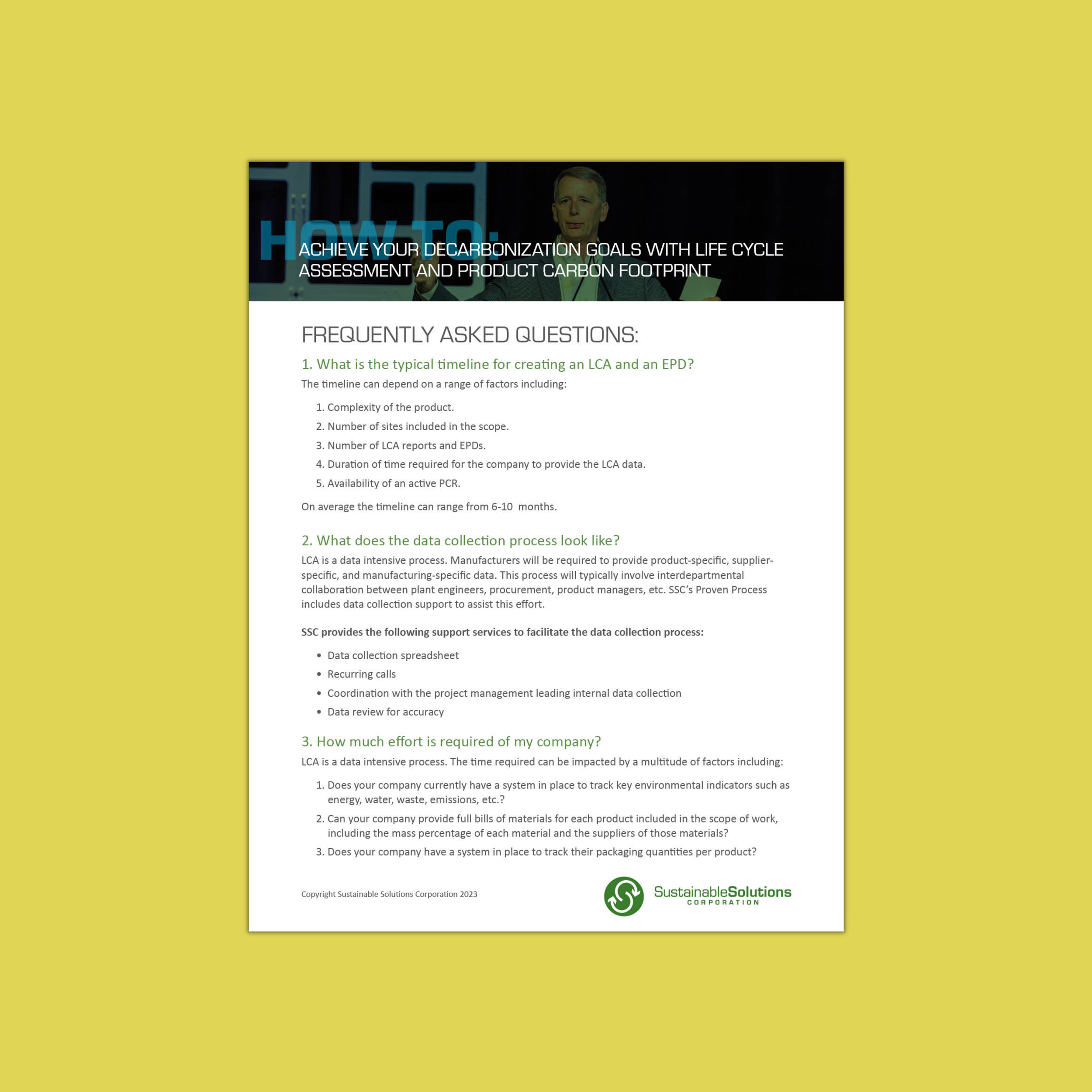EPD Generator Process
Sustainable Solutions Corporation (SSC) has over 23 years of experience in developing and delivering valuable Life Cycle Assessments (LCA) and Environmental Product Declarations (EPD) generator tools, designed to empower organizations to transparently communicate the environmental impact of their products.
Our innovative platform streamlines the EPD creation process, making it accessible for businesses of all sizes, while ensuring adherence to international standards.
SSC's EPD generator process is an Excel-based approach to developing parameterized LCA models to allow manufacturers to develop EPDs in a more cost-effective and timely manner. EPD generator tools are based on specific Product Category Rules (PCR) and are developed to incorporate life cycle inputs and outputs that are specific to products that are covered under the specific PCR and manufactured from a predefined set of facilities.
Why Choose SSC?
-
SSC has developed EPD generator tools for individual manufacturers with multiple facilities, as well as industry associations with various supporting member organizations and facilities.
Our expertise enables us to provide comprehensive insights into the environmental impact of products and processes across industries. By leveraging cutting-edge EPD tools, we help organizations make informed decisions that promote sustainability.
-
We adhere to ISO, PCR, and any applicable European standards to ensure the highest level of accuracy, transparency, and credibility.
Our team of experts evaluate your LCA using ISO 14040 and ISO 14044 standards.
-
SSC's unique approach to EPD generators maintains the SSC standard of providing support and education to manufacturers through the data collection and result development process.
-
With SSC’s expertise and innovative solutions, organizations can effectively showcase their dedication to sustainable development, ultimately positioning themselves as credible leaders in their respective industries.
To conduct an effective LCA, detailed information on various aspects of the product life cycle is essential. This includes:
Raw Materials: Comprehensive data on the composition, source, and extraction methods of raw materials.
Supplier Locations and Modes of Material Transport: Data on the geographic origin of materials and modes of transport.
Manufacturing/Processing/Assembly Operations: Detailed insights into manufacturing processes, energy consumption, water consumption, support and ancillary material use, waste and wastewater production, emissions, etc.
Packaging: Data on the primary or secondary packaging materials - evaluating packaging impacts can provide opportunities for dematerialization or remissions reductions.
Distribution: Evaluation of downstream transportation methods, distances, and modes of transport.
Installation and Use: Analysis of energy and material consumption during product installation to the building site as well as impacts related to product use, including, energy/water/material consumption in use, maintenance, repair/refurbishment, replacements, and operational energy and water use.
End-of-Life: Consideration of end-of-life scenarios, including disposal, recycling, or reuse options. Manufacturers should consider the end-of-life stage during the new product development process.
Benefits of LCA
Identify Environmental Impact Drivers
LCA can help focus limited resources to plan and implement the biggest impact reductions first.
Avoiding Material Risks
LCAs identify areas of risk and material concerns in the supply chain and production process.
Customer Demands
LCAs are used to satisfy customer-sustainable supply chain requirements and demand for transparency with scientifically based data.
Waste Reduction
LCAs can also be used to calculate the impacts of various waste disposal options to reduce overall impacts and costs.
Cost Reduction
Considering alternative materials, production techniques, shipping methods, and disposal systems identifies opportunities for financial cost savings and environmental impact reductions.
Brand Recognition
Competition in the global marketplace is becoming tougher and distinguishing your company and products as a responsible brand is a solid strategy to improve brand positioning and capture market share.
Stepping Stone in CSR
Quantifying and understanding the total impacts associated with goods produced gives your organization the data needed to establish goals, prioritize initiatives, and allocate resources accordingly.
Sustainability Standards
Many markets and standards are driving whole product industries toward further transparency.
Resources
From Assessment to Action: Integrating LCAS and epds
In this document, we provide:
The transformative approaches in Life Cycle Assessments (LCA) and Environmental Product Declarations (EPD)
The three types of LCAs include Life Cycle Assessment Optimized and Comparative Life Cycle Assessments
A readiness assessment you should answer before engaging in an LCA study
Frequently Asked Questions
Glossary and key terms
Educational Series: Achieve Your Decarbonization Goals with LCA and PCF
“THESE WEBINARS WERE AN EXCELLENT USE OF TIME AND I WOULD NOT HESITATE TO SIGN UP FOR MORE.”
A comprehensive three-part educational course that teaches you the fundamentals of Life Cycle Assessments (LCA) and Product Carbon Footprints (PCF).

















